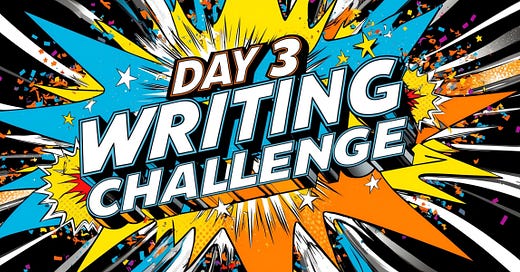Day 3 of my 30-day writing challenge, and here I am, staring at a damn blank screen, wondering where the words are. But more than the words, what will I write about?
If I knew that, I think the words wouldn't be a problem.
Soooo my mission to level up my writing game has already hit a wall !!!!
The ideas are gone, and now I'm left scrambling for something, anything, to fill this page today instead of leaving it blank.
Maybe I should write about the struggle, as the STRUGGLE IS REAL !!
Searching for inspiration and how elusive it can be. After all, I know every writer runs into this problem, especially if they're trying to write every day.
I found it! I found the solution that I'm going to use: "Writing Templates or Writing Prompts."
While part of the last writing cohort, I was given the solution to this problem as a bonus gift of 100 Writing Templates.
Yep, you guessed it - today is going to be the day that I use a template as part of my 30-Day Writing Challenge.
This should not matter as I don’t send out my daily articles as I don’t want you guys to unsubscribe because I am sending you too many emails :-)
So now that I have the template, I still had to decide what I would write about, so I chose to stay the course this week by continuing writing about LLMs, Prompting, and AI.
Here is the the template I used
So, with that said the article below is today's article.
Unconventional Wisdom: The Surprising Truth About Prompt Engineering
When it comes to crafting the perfect writing prompt or mastering the art of prompt engineering, there are plenty of myths and misconceptions circulating in the AI and writing communities. You may have encountered some of these before:
"The best prompts are short and simple."
"You need to be a programming wizard to engineer effective prompts."
"Prompt engineering is only for advanced AI users."
If any of these sound familiar, get ready for a surprise! We're about to debunk these myths and uncover the unexpected truths about what it really takes to create powerful, engaging writing prompts and master the skill of prompt engineering.
The Unconventional Wisdom
Specificity is key. While concise prompts have their place, the most effective writing prompts are often rich in detail and context. By providing specific information about your desired tone, style, audience, and objectives, you enable the generation of more targeted, high-quality content that aligns with your vision.
Prompt engineering is a learnable skill. Contrary to popular belief, you don't need a degree in computer science or a background in programming to become a skilled prompt engineer. Like any craft, prompt engineering can be learned and honed through practice, experimentation, and learning from others in the community. With persistence and a growth mindset, anyone can develop this valuable skill.
Prompt engineering is for everyone. Whether you're a casual user of AI writing tools or a seasoned professional, prompt engineering can help you get more out of these powerful technologies. By understanding how to structure and optimize your prompts, you can unlock new levels of creativity, efficiency, and quality in your writing process. Prompt engineering is a universal skill that benefits writers, marketers, researchers, and beyond.
That's the unconventional wisdom in a nutshell. No arcane knowledge, no elite skills required. Just a willingness to experiment, learn, and think beyond the conventional advice.
So, if you've been shying away from exploring writing prompts and prompt engineering because you thought it was too complicated, too technical, or just not for you - it's time to reconsider. The path to prompt mastery is open to all who are willing to walk it.
Are you going to take the journey and embrace the unconventional wisdom and see where it takes your writing !








